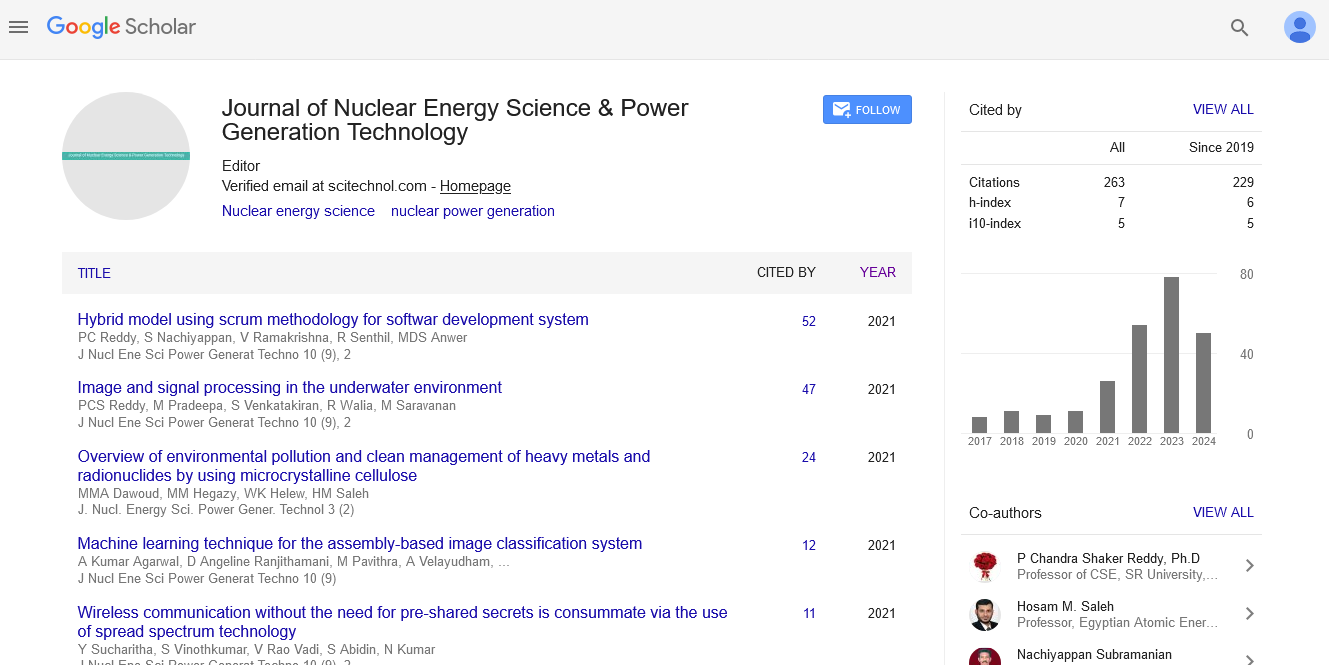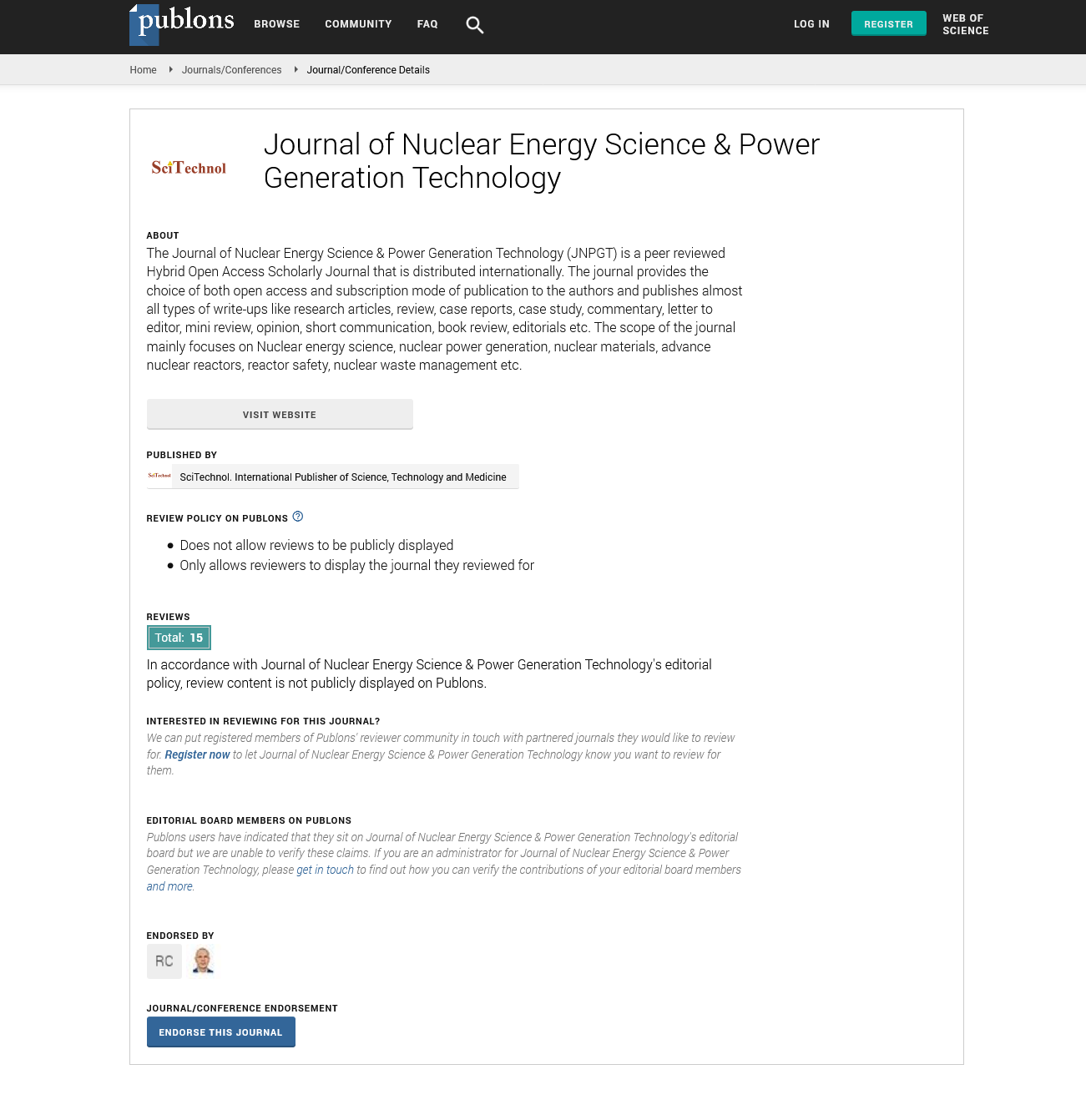Energy consumers’ perceptions and behavior regarding their social and private energy and environmental costs
Omid Mohammadzadeh Rouhani
McGill University, Canada
: J Nucl Ene Sci Power Generat Technol
Abstract
Despite the adverse health and environmental impacts of energy consumption, consumers continue making unsustainable consumption decisions mainly due to the lack of sustainable alternatives (such as renewable energy sources, energy efficiency opportunities, public transport, etc.) and/or due to the lack of information regarding the associated energy and environmental costs. Sustainable energy consumption behavior and choices, however, are becoming increasingly vital to address growing climate change and other environmental concerns. Informing consumers of their footprints is emerging as a potential means of promoting sustainable development in forms of smart cities, advanced traveler information systems, resilient infrastructure programs, etc. However, the impact of offering such information on consumers is yet to be determined. Similar to other energy consumption patterns, urban travel could have significant adverse health and environmental impacts. A study conducted in Europe found that an increase of 4000 vehicle-km in daily road traffic within 100 meters of people’s residence is associated with a 10% increase risk in lung cancer ( Raaschou-Nielsen et., 2013). Another study ( Crouse et al., 2012) found a mortality increase of 27% to 35% for each 10-μg/m3 increase in fine particulate matter (PM2.5¬) concentrations. Research studies also found that transport users are becoming more aware of the necessity to reduce carbon emissions, however, they are not willing to change their travel behavior mainly because of the inability to perceive the associated social and private costs (Chatterton et al., 2014). In practice, fuel consumption and emissions costs have a minor effect, if any, on travel-choice behavior. The fundamental reasons are that drivers do not perceive fuel consumption costs as out-of-pocket costs (Hughes et al., 2008; Anas et al., 2012), and they usually do not have intelligible information about the substantial health-related implications of emissions (Prillwitz, and Barr, 2011). These costs can be perceived using an information communication system (Rouhani and Gao, 2014), calculating and providing effects to different user groups (Chatterton et al., 2009). By raising driver awareness regarding the social and environmental consequences of travel, a carefully designed scheme can provide considerable benefits for large metropolitan areas, where small positive changes in travel behavior could save millions of dollars in time, fuel, and emissions costs. In this talk, I examine the influence of offering such information on individuals’ travel decisions examining real-life driving patterns and a survey we conducted in Montreal, Canada. We found that urban travelers are generally unaware of the energy and environmental footprints of their travel. Over 80% are unable to estimate their fuel consumption, GHG social costs, and health-related air pollution costs across different travel modes. A personalized information system could fundamentally influence travel decisions especially route choices. This research thread will also play an important role in efforts to estimate transportrelated greenhouse gas (GHG) emissions from major metropolitan areas and to calculate annual national GHG inventory to meet UNFCCC obligations. Moreover, it would be beneficial to provincial governments and/or environmental agencies, as it indicates the feasibility of a low-cost energy management system that saves energy, preserves environment, and induces sustainable energy consumption decisions.
Biography
Omid Mohammadzadeh Rouhani, expertise is in the area of transportation economics and transportation systems analysis. His research program focuses on: network design problems, road and congestion pricing; advanced traveler information systems; public private partnership projects, energy policy analysis; optimization techniques for transportation problems; and sustainable infrastructure systems.
E-mail: omid.rouhani@mcgill.ca
 Spanish
Spanish  Chinese
Chinese  Russian
Russian  German
German  French
French  Japanese
Japanese  Portuguese
Portuguese  Hindi
Hindi 

